Ancient Manuscripts from
the Desert Libraries of Timbuktu
Timbuktu, Mali, is the legendary city founded as a commercial
center in West Africa nine hundred years ago. Today it is synonymous
with the phrase "utterly remote," but this was not always
so. For more than six hundred years, Timbuktu was a significant
religious, cultural, and commercial center whose residents traveled
throughout Asia, Africa, and Europe. Timbuktu was famous for educating
important scholars who were well known throughout the Islamic
world. Many individuals traveled to the city to acquire knowledge;
others came to acquire wealth and political power.
Situated on the edge of the Sahara Desert, Timbuktu was famous
among the merchants of the Mediterranean basin as a market for
obtaining the goods and products of Africa south of the desert.
However, Timbuktu's most famous and long-lasting contribution
to Islamic and world civilization is the scholarship practiced
there. By at least the fourteenth century, important books were
written and copied there, establishing the city as the center
of a significant written tradition in Africa.
These ancient manuscripts cover every aspect of human endeavor.
The manuscripts are indicative of the high level of civilization
attained by West Africans during the Middle Ages and provide irrefutable
proof of a powerful African literary tradition. Scholars in the
fields of Islamic Studies and African Studies believe that analysis
of these texts will cause Islamic, West African, and World History
to be reevaluated. These manuscripts, surviving from as long ago
as the fourteenth century, are remarkable artifacts important
to Malian and West African culture.
The exhibited manuscripts date from the sixteenth to eighteenth
century.
The manuscripts on view are from the Mamma Haidara Commemorative
Library and the Library of Cheick Zayni Baye of Boujbeha, two
of the most noteworthy institutions in the Timbuktu area. As part
of its continuing effort to create a universal collection of recorded
knowledge from all geographic areas and all historical eras, the
Library of Congress included these artifiacts in its collections
and will be available for use by researchers and scholars.
| 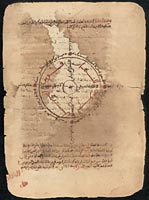
Recto
|
Structure
of the Heavens
This text was written to train scholars in the field of astronomy,
a science that Islamic tradition traces back to Adam and to
the Prophet Idris. The author discusses how to use the movements
of the stars to calculate the beginning of the seasons and
how to cast horoscopes, among many other aspects of astronomy.
Displayed is a diagram demonstrating the rotation of the heavens.
Nasir al-Din Abu al-Abbas Ahmad
ibn al-Hajj al-Amin al-Tawathi al-Ghalawi. Kashf al-Ghummah
fi Nafa al-Ummah
(The Important Stars Among the Multitude of the Heavens),
copied 1733. Loaned by the Mamma Haidara Commemorative Library,
Timbuktu, Mali (1) |
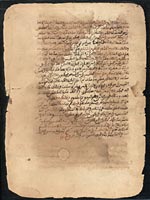
Verso
|
| |
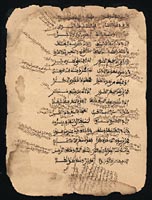
Recto |
Laws of Commerce
in Verse
This volume delineates the obligations of parties to commercial
exchanges and contracts. The author focuses on sales and how
individuals loaning money are to be protected in commercial
transactions. Verse is used to aid in memorizing the text.
Ahmad ibn Bud ibn Muhammad al-Fullani.
Sullam al-Atfal fi Buyu al-Ajal
(The Protection of Individuals in Commercial Transactions).
Loaned by the Mamma Haidara Commemorative Library, Timbuktu,
Mali (4) |
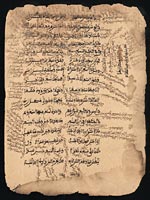
Verso |
| |
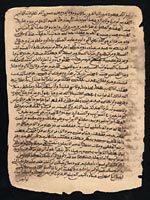
Recto |
Songhai Empire and Islam
The Songhai Empire was one of the most important states in
West Africa during the fourteenth and fifteenth centuries.
Muslims lived in significant numbers within the empire's domains.
This work examines the history of the empire and discusses
important questions of Islamic law which arose in the empire,
including the status and rights of women and children in a
Muslim society.
Sayyid al-Mukhtar ibn Ahmad ibn Abi Bakr
al-Kunti al-Kabir.
al-Minnah fi Itiqad Ahl al-Sunnah
(The Gift of the Followers of the Path of Muhammad),
copied 1809.
Loaned by the Mamma Haidara Commemorative Library, Timbuktu,
Mali (5) |
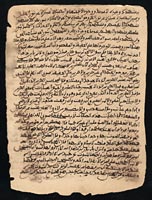
Verso |
| |
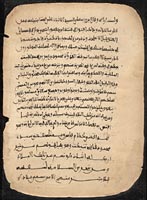
Recto |
The Law of Slavery
The author discusses slavery as it existed in West Africa
during the seventeenth century.
Ahmad Baba ibn Ahmad ibn Umar ibn Muhammad
Aqit al-Tumbukti.
Miraj al-Suud ila nayl Majlub al-Sudan
(Ahmad Baba Answers a Moroccan's
Questions about Slavery).
Loaned by the Mamma Haidara Commemorative Library, Timbuktu,
Mali (6) |
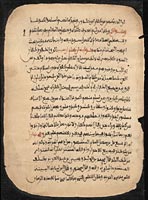
Verso |
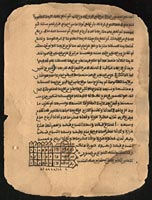
Recto |
Arithmetic Primer
This commentary by the eighteenth-century scholar al-Rasmuki
explains a work by al-Samlali the medieval mathematician.
Using charts and examples of problems, the commentator demonstrates
the rules of addition, subtraction, multiplication, and division.
He also discusses the history and development of mathematics.
The text was used extensively by students in Timbuktu and
North Africa.
Ahmad ibn Sulayman al-Rasmuki.
Kashf al-Hijab li-Asfiya' al-Ahbab an Ajnihat
al-Righab fi Marifat al-Hisab
(Explanations of the Problems in Arithmetic with Examples).
Loaned by the Mamma Haidara Commemorative Library, Timbuktu,
Mali (11) |
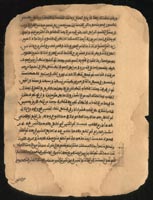
Verso |
| |
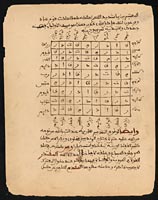
Recto |
Disease and Cure in Timbuktu
This compilation of cures instructs the reader about methods
of diagnosing and medicating the sick. The author also explains
the use of animal, plant, and mineral substances as medications.
Prayers and Koranic verses that are helpful against illness
are included. Displayed are instructions for writing prayers,
helpful to the sick, for use in amulets.
Sayyid Ahmad ibn Amar al-Raqadi al-Tumbukti
al-Kunti.
Shifa' al-Asqam al-Aridah fi al-Zahir wa-al-Batin min
al-Ajsam
(Curing Diseases and Defects both Apparent and Hidden).
Loaned by the Mamma Haidara Commemorative Library, Timbuktu,
Mali (16) |
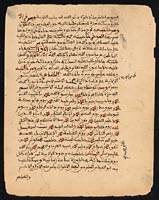
Verso |
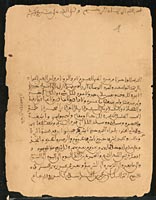
Recto |
Answer to a Royal Request
This document is a reply to the ruler of Massinah, Amir Ahmad,
who ordered the arrest of a German traveler, Heinrich Bart,
suspected of spying for the British. The author of the reply
cites Islamic law as making the arrest illegal and declines
to obey the amir. The scholar states that a non-Muslim entering
the domain of Muslims in peace is protected and may not be
arrested, have his property confiscated, or to be otherwise
hindered.
Ahmad al-Bakayi ibn Sayyid Muhammad
ibn Sayyid al-Mukhtar al-Kunti.
Jawab Ahmad al-Bakayi ala Risalat Amir
al-Mu'minin Ahmad al-Masini
(The Response of Ahmad al-Bakayi to the
Letter of Amir Ahmad, Ruler of Massinah),
eighteenth century.
Loaned by the Mamma Haidara Commemorative Library, Timbuktu,
Mali (19) |
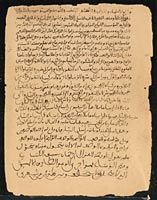
Verso |
| |

Recto |
Slave Trade
This is an agreement among merchants involved in the sale
and transportation of slaves between Timbuktu in Mali and
Ghadamas in Libya.
Commercial agreement.
Loaned by the Mamma Haidara Commemorative Library, Timbuktu,
Mali (21) |

Verso |
| |
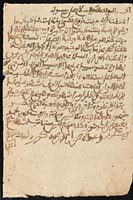
Recto |
Freedom for a Slave
This certificate gives a detailed physical description of
a woman who is being granted her freedom by her owner. The
document is drawn in the manner prescribed by Islamic law.
Certificate of emancipation for female slave.
Loaned by the Mamma Haidara Commemorative Library, Timbuktu,
Mali (23) |
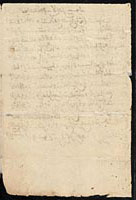
Verso |
(excerpted from the Library of Congress Exhibition)
|